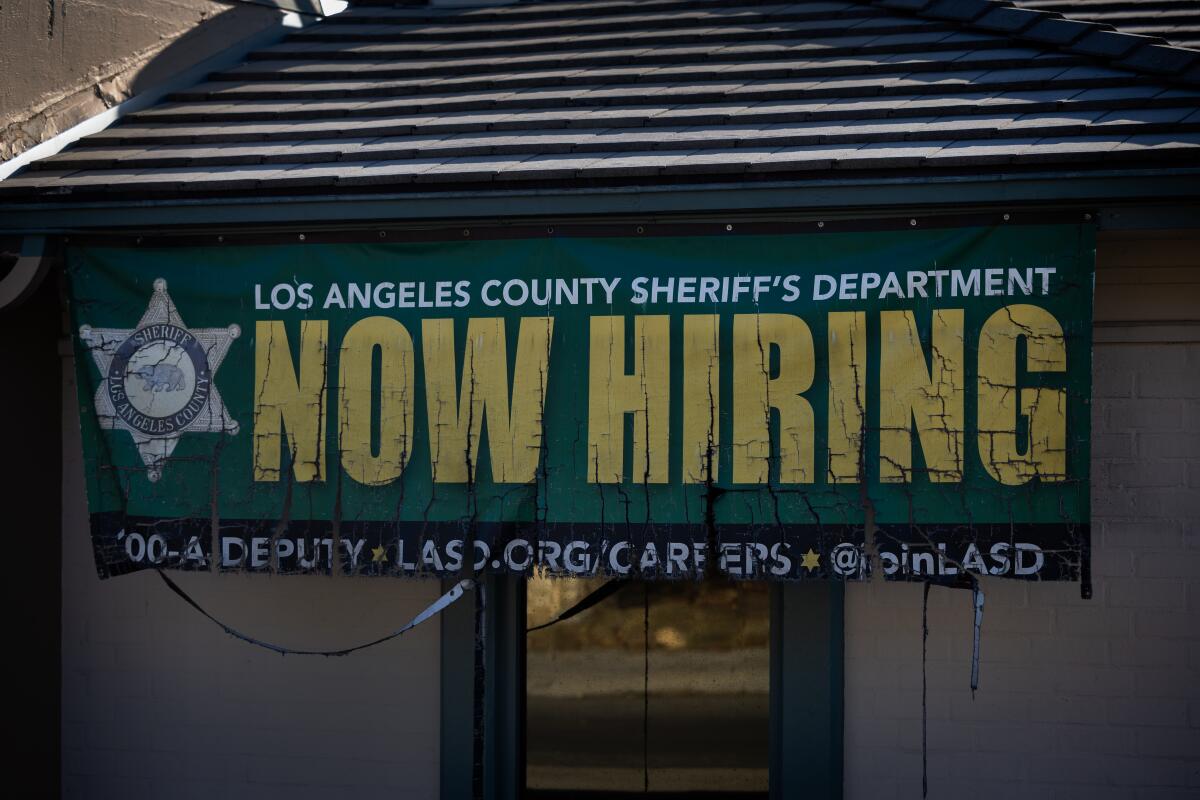-
Cubs vs. White Sox Highlights | MLB on FOX - 7 mins ago
-
Vikings’ Justin Jefferson Makes His Feelings Known About JJ McCarthy - 33 mins ago
-
Marlins vs. Brewers Highlights | MLB on FOX - 52 mins ago
-
How to Watch Australia vs British & Irish Lions: Live Stream Rugby, TV Channel - about 1 hour ago
-
The Basketball Tournament 2025: Everything to Know Ahead of the Quarterfinals - 2 hours ago
-
India’s New Deals Leave US to Catch Up - 2 hours ago
-
Rockies vs. Orioles Highlights | MLB on FOX - 2 hours ago
-
Trump thinks Hamas will have to be ‘hunted down’ by Israel - 2 hours ago
-
White House Responds After Judge Blocks Trump Birthright Citizenship Order - 2 hours ago
-
Bringing a growth mindset to learning Hungarian - 3 hours ago
L.A. County sheriff, watchdog clash over deputy killing investigations
It was just past 12:30 a.m. on June 9 when Los Angeles County Sheriff’s deputies responded to a burglary in progress at a home in Lynwood.
Upon arrival, according to the department’s incident summary, they saw Federico Rodriguez, 45, through a window, holding what appeared to be a pair of scissors.
Hearing screams inside, deputies forced a door open and entered the home, where they found Rodriguez repeatedly stabbing a woman. Sgt. Marcos Esquivel immediately drew his handgun, footage from his body-worn camera showed, and fired multiple shots that killed Rodriguez.
The incident was the fifth of six fatal shootings by deputies that the sheriff’s department has reported so far this year.
The woman Rodriguez was stabbing survived. But despite the apparently life-saving actions of the deputies, two days later the case became a point of controversy in a broader dispute between the department and L.A. County’s Office of Inspector General, which investigates misconduct and the use of deadly force by law enforcement.
The inspector general’s office sent a letter on June 11 to the County Board of Supervisors raising concerns that officials have been blocked from scenes of shootings by deputies and deaths in county jails.
Inspector General Max Huntsman said his office interprets the state law that led to its creation over a decade ago as giving him and his staff the authority to conduct meaningful on-site investigations, with state legislation approved in 2020 strengthening that power.
Inspector General Max Huntsman listens to testimony in the Robinson Courtroom at Loyola Law School in 2024.
(Irfan Khan / Los Angeles Times)
Huntsman said allowing his staff to tour scenes of shootings and receive information directly from homicide detectives and other sheriff’s department personnel while the dead bodies have yet to be removed is essential for proper oversight.
But the sheriff’s department has repeatedly denied or limited access, Huntsman said. The June 11 letter announced the “indefinite suspension of Office of Inspector General regular rollouts to deputy-involved shootings and in-custody deaths.”
Huntsman said the decision to halt the rollouts was a response to a persistent lack of transparency by the sheriff’s department.
“The purpose of going there is to conduct an independent investigation. If all we’re doing is standing around being fed what they want us to know, that is not an independent investigation,” he told The Times. “We’re not going to pretend to be doing it when we only get to peek under the curtain.”
At the Civilian Oversight Commission meeting on July 17, Sheriff Robert Luna said his department “will now have a process in place” to allow officials responding to shooting scenes to contact an assistant sheriff to ensure “a little more oversight” over the process.

An interior view of the Altadena Sheriff Station in January.
(Allen J. Schaben / Los Angeles Times)
Luna called Huntsman’s June 11 letter “alarming,” but disputed how many times officials had been turned away, saying he was only aware of it happening “once — at least in the last five years.”
Commissioner Jamon Hicks inquired further, asking whether the department could be incorrect about the number of times access has been restricted or denied, given that the inspector general’s office alleges it has been a recurring issue.
“It could be, and I’d love to see the information,” Luna said. “I’ve been provided none of that to date.”
Huntsman told The Times that officials from his office were “prohibited from entering” Rodriguez’s home on July 9, as were members of the district attorney’s office and the sheriff’s department’s Internal Affairs Bureau. It was at least the seventh time the sheriff’s department had improperly limited access since 2020, he said.
In a statement, the sheriff’s department said the “claim that the OIG was denied access on June 9 at a [deputy-involved shooting] scene in Lynwood is inaccurate.”
“An OIG representative was on scene and was given the same briefing, along with the concerned Division Chief, Internal Affairs Bureau, Civil Litigation Bureau, Training Bureau, and the Los Angeles County District Attorney’s Office,” the statement said.

An exterior view of the hiring banner outside the Altadena Sheriff Station in January.
(Allen J. Schaben / Los Angeles Times)
The statement went on to say that the department is “only aware of one incident on February 27, 2025,” in which the OIG was denied access to a deputy-involved shooting scene.
“The Sheriff’s Department remains firmly committed to transparency in law enforcement and continues to work closely and cooperatively with all oversight bodies,” the statement said.
During the July 17 meeting, Dara Williams, chief deputy of the Office of Inspector General, said the office’s personnel often arrive at shooting scenes hours after deputies have pulled the trigger because of the logistical challenges of traveling across the county. Sheriff’s department homicide detectives typically present preliminary findings and offer tours of the scenes.
But on several occasions, the watchdogs have been denied access entirely, leaving them to rely solely on whatever information the sheriff’s department chooses to release, Williams said.
Hans Johnson, the Civil Oversight Commission’s newly elected chair, said investigators can’t do their jobs properly without being able to scrutinize homicide scenes.
“We count on you, in part, as eyes and ears in the community and in these high-value and very troubling cases of fatalities and deaths,” he said at the July 17 meeting.
Williams said the the sheriff’s department has also been “painfully slow” responding to requests for additional information and records following homicides by deputies. She said that in one particularly egregious example, “we served a subpoena in October of last year and we are still waiting for documents and answers.”
Responding to Huntsman’s letter on June 16, Luna wrote to the Board of Supervisors that the department’s Office of Constitutional Policing “has assisted the OIG by providing Department information to 49 of 53 instances” since January. “Suffice it to say,” he added later in the letter, “robust communications take place between the OIG and the Department. Any assertion to the contrary is false.”
Luna said sometimes access could be restricted to preserve evidence, but Williams said she does not “think it’s fair to say that we were excluded” for that reason.
Williams told the commission she was not allowed to tour a scene earlier this year that Huntsman later told The Times was a Feb. 27 incident in Rosemead.
The sheriff’s department’s incident summary stated that Deputy Gregory Chico shot Susan Lu, 56, after she refused commands to drop a meat cleaver and raised the blade “toward deputies.” Lu was taken to a hospital and declared dead later that day.
In his June 16 letter, Luna wrote that “the OIG, Internal Affairs Bureau (IAB), other Department units, and executives were denied access … due to concerns regarding evidence preservation, given the confined area and complexity of the scene layout.”
Williams told the commission “there was a narrow hallway but the actual incident took place in a bedroom, so I don’t know why we couldn’t have walked down that narrow hallway to just view into the bedroom” where the homicide took place.
“The bottom line,” she added later, “is we don’t want to mislead the public to give them the idea that this is actually effective oversight because, once again, we’re just getting the information from the department.”
Source link































